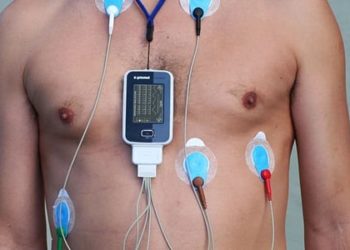Sickle cell trait not linked to increased risk of ischemic stroke
1. In this meta-analysis of prospective population-based studies, sickle cell trait (SCT) was not associated with any difference in risk of first ischemic stroke.
2. After adjusting for known ischemic stroke risk factors, the presence of SCT was still not linked to any different risk of ischemic stroke.
Evidence Rating Level: 2 (Good)
Study Rundown: Sickle cell disease is a genetic disorder caused by the presence of a homozygous mutation in the beta-globin gene and results in hemolysis and increased risk of thrombotic events. The heterozygous presence of the mutation results in SCT, and is prevalent in approximately 8% of the African-American patients. SCT is linked to increased risk of venous thromboembolic events, and is hypothesized to in part explain the increased risk of ischemic stroke in African-Americans as compared to non-hispanic white patients. The current study analysed the results of four large, prospective, population-based studies of incident ischemic stroke which included African-American participants and had genetic data available to ascertain SCT status. The analysis found that SCT did not result in any different risk for first-time stroke, and this result did not change when accounting for known vascular risk factors or genotyping data.
The results of the study provide evidence against the hypothesis that SCT may explain the difference in ischemic stroke risk between African-American and white populations. Further studies are needed to help understand the increased risk of stroke in this population. Patients with SCT with stroke should undergo full work up for underlying causes of stroke not related to their SCT. The major strengths of the study include the large population of prospectively studied patients with well documented vascular risk factors. The major limitations of the study include the lack of data on ischemic stroke subtype– associations with SCT and specific subtypes of ischemic stroke could not be evaluated.
Click to read the study, published in JAMA Neurology
Relevant Reading: Sickle Cell Trait and Cognitive Function in African Americans: The Reasons for Geographic and Racial Differences in Stroke (REGARDS) Cohort
In-Depth [meta-analysis]: The study is a meta-analysis of four large, prospective studies which included African-American patients: the Jackson Heart Study, Multi-Ethnic Study of Atherosclerosis, Reasons for Geographic and Racial Differences in Stroke, and Women’s Health Initiative. Participants were included in the meta-analysis if they had no missing covariate data, and were not homozygous for the sickle cell mutation, or compound heterozygous (such as with HbSC disease). Patients were assessed at baseline and then annually or semi-annually with stroke incidence determined by hospitalizations, self-reports, and supportive radiographic evidence. SCT was determined using direct genotyping with PCR, or whole-exome sequencing and imputation.
The study included 19 464 African-American patients including 1520 with SCT. The rates of ischemic stroke were not different between those with SCT (2.9 per 1000 person-years) or without SCT (3.2 per 1000 person-years). The hazard ratio for risk of ischemic stroke for patients with SCT compared to those without was not significant (HR, 0.80; 95% CI, 0.47-1.35; p = 0.82). The analysis was consistent after adjusting for vascular risk factors, and genotype data.
Image: CC/Wiki
©2018 2 Minute Medicine, Inc. All rights reserved. No works may be reproduced without expressed written consent from 2 Minute Medicine, Inc. Inquire about licensing here. No article should be construed as medical advice and is not intended as such by the authors or by 2 Minute Medicine, Inc.







